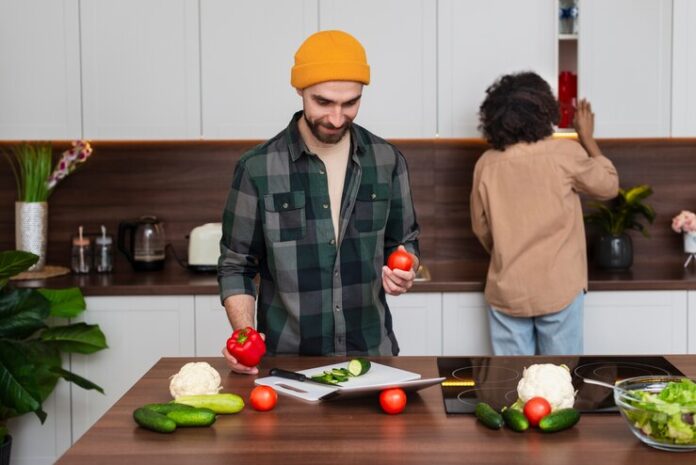Cooking is more than just a necessary life skill; it’s a gateway to creativity, nutrition, and even self-care. For beginners, stepping into the kitchen can be both exciting and intimidating. Where do you start? What tools do you need? How do you avoid burning everything in sight?
If you’re ready to ditch takeout and frozen meals for homemade, flavorful dishes, you’ve come to the right place. This guide will walk you through essential cooking tips for beginners, from basic techniques and kitchen tools to healthier meal options and saving those inevitable first “oops” mishaps.
Why Learning the Basics Is Key
Mastering the fundamentals of cooking is like learning the alphabet before writing a novel. By focusing on the foundational skills, you’ll not only become more confident in the kitchen but will also set yourself up for delicious success in your culinary adventures.
Essential Tools for the Beginner Cook
A well-equipped kitchen is the backbone of any successful cooking experience. But don’t worry—you don’t need a professional chef setup to start making great meals.
Must-Have Tools for Every Beginner
Here’s a list of tools you should have on hand and how to use them effectively:
- Chef’s Knife: A high-quality, multi-purpose knife is non-negotiable. Use it for chopping vegetables, slicing meat, or mincing herbs. Look for one that feels balanced in your hand.
- Cutting Board: Invest in a sturdy, easy-to-clean cutting board to protect your counters and your knife.
- Measuring Cups and Spoons: Accuracy is key, especially when starting out with recipes.
- Non-Stick Pan and Saucepan: These basics will handle sautéing, frying, boiling, and simmering with ease.
- Mixing Bowls: Useful for everything from mixing batters to tossing salads.
- Tongs and Spatula: Tongs make flipping food a breeze, while a spatula is perfect for stirring and serving.
Tips for Budget-Friendly Tool Shopping
You don’t need to spend a fortune. Focus on buying mid-range tools that are durable, with online reviews as your guide. Also, prioritize functionality over aesthetics—you can always upgrade later!
Understanding Basic Cooking Techniques
Learning to cook is like learning to dance; once you nail the steps, you can perform with confidence.
Common Methods for New Cooks
- Sautéing: Cooking food quickly in a hot pan with a small amount of oil. Perfect for vegetables, chicken, or shrimp.
- Pro Tip: Keep the food moving to prevent burning and ensure even cooking.
- Boiling: Heating water to a rolling bubble to cook pasta, rice, or veggies.
- Pro Tip: Salt your water—it makes a big flavor difference!
- Baking: Cooking food in the oven, great for casseroles, cakes, and more.
- Pro Tip: Always preheat your oven and use an oven thermometer for accuracy.
Mastering these simple techniques boosts your versatility as a cook.
The Importance of Meal Planning
One of the best cooking tips for beginners is to plan your meals. Meal planning not only saves time and money but also eliminates the daily “What’s for dinner?” stress.
Benefits of Meal Planning
- Reduces food waste.
- Encourages healthier eating habits.
- Helps you stay within your grocery budget.
How to Start Meal Planning
- Pick 2–3 recipes for the week. Keep them simple and familiar.
- Make a shopping list based on your chosen meals.
- Prep ingredients in advance (chop veggies, marinate meat) to save time during busy weekdays.
Once you start, you’ll wonder how you lived without it!
Cooking Tips for Healthier Meals
Healthy eating doesn’t mean boring food. Small changes to your cooking habits can make a big difference.
Easy Substitutions
- Use Greek yogurt instead of sour cream.
- Swap white rice for quinoa or brown rice.
- Try baking or grilling instead of frying.
Portion Control and Balanced Nutrition
Visualize your plate as a balance of food groups. A good rule of thumb is to aim for 50% vegetables, 25% lean protein, and 25% whole grains.
Healthy cooking is about balance and variety, not restriction.
Experimenting with Flavors
Cooking isn’t just about following recipes; it’s an art. Playing with flavors allows you to make meals your own.
Herbs, Spices, and Flavor Pairing
Stock your pantry with versatile spices (like garlic powder, paprika, and cumin) and fresh herbs (like parsley and basil). Experiment with combinations to find flavors you love—like pairing rosemary with potatoes or cinnamon with butternut squash.
Create Your Signature Dish
Once you feel comfortable, mix and match ingredients to create something unique. You might stumble on a dish that becomes your specialty!
Troubleshooting Common Cooking Mistakes
We all make mistakes in the kitchen; it’s part of the learning process! Here’s how to fix some common errors and build resilience when things go wrong.
Common Mistakes and Fixes
- Over-salted soup? Add a peeled potato to absorb excess salt.
- Burnt edges on baked goods? Trim them off and salvage the center.
- Rice too sticky? Rinse in cold water and fluff with a fork.
Every mistake is an opportunity to learn. Don’t give up—mastery takes time.
Level Up Your Cooking Confidence
Congratulations—you’re already on your way to becoming a great home cook! To recap, focus on the basics:
- Equip your kitchen with essential tools.
- Master a few key techniques like sautéing and baking.
- Plan meals to save time and stress.
- Experiment with flavors and learn from mistakes.
Most importantly, keep cooking and have fun with it! Share your favorite beginner cooking tips in the comments below—every chef starts somewhere, and your tips might inspire someone else.
Remember, every great chef started by mastering the basics. Your cooking adventure is just beginning!


